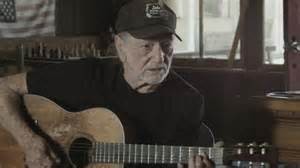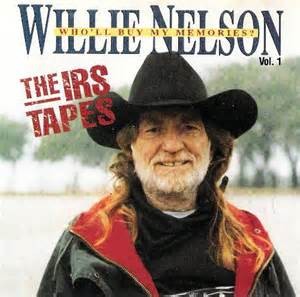The song “The Wall” is by Willie Nelson, from his 2014 album Band of Brothers. The album is a celebration of Willie’s life on the road, and the trials and tribulations he has faced along the way. The song is a verse chorus song, about how he has triumphed over these obstacles, and is looking forward to where his life will take him now because he is still fighting on. Nelson is the speaker in this song and he is speaking about overcoming the challenges life has thrown him, which are symbolized by walls.
 The repetition of “I hit the wall/And the wall came down” serves to make the listener feel Willie’s triumph. He sings more in these lyrics, whenever they appear in the song, than any other lines, where he kind of talk-sings. The fact that he uses a powerful delivery that is very different from the rest of the song makes these lyrics stand out. Nelson often talk-sings, it is both his signature style and the fact that he doesn’t have the voice to sing ballad-type songs. He talk-sings when he sings about “the hardships and regrets of a life spent on the bus,” but when singing of his breaking down of the barriers, he sings forcefully and powerfully, sounding “triumphant rather than weary” (Deusner). The song gets this meaning across using the repetitive form, where Nelson repeats that he overcame the wall over and over again, with slight variations from time to time.
The repetition of “I hit the wall/And the wall came down” serves to make the listener feel Willie’s triumph. He sings more in these lyrics, whenever they appear in the song, than any other lines, where he kind of talk-sings. The fact that he uses a powerful delivery that is very different from the rest of the song makes these lyrics stand out. Nelson often talk-sings, it is both his signature style and the fact that he doesn’t have the voice to sing ballad-type songs. He talk-sings when he sings about “the hardships and regrets of a life spent on the bus,” but when singing of his breaking down of the barriers, he sings forcefully and powerfully, sounding “triumphant rather than weary” (Deusner). The song gets this meaning across using the repetitive form, where Nelson repeats that he overcame the wall over and over again, with slight variations from time to time.
The song also uses the syllogistic progressive form, talking chronologically about obstacles Nelson has faced, and then how he overcomes them. First he sings how he “took on more than [he] could handle,” then how he “went off like a Roman candle” hurting those around him, and finally how he “[took] things to make it better.” This syllogistic progression does not necessarily have logic to it, but the listener can feel it unfolding. The listener feels the buildup of all these problems, which is a natural lead into the strong, powerful delivery and the multiple repetitions of the chorus declaring he beat them.
“The Wall” is a mixture of the plain style and the middle style: the lyrics are very simple, but some lyrics are metaphorical or euphemistic, like how the wall really means his breaking point, a seemingly insurmountable breaking point, or a point in Nelson’s life where he felt he could no longer go on. However, this is really the only figurative language Nelson uses in this song, the rest of it is definitely simple, in the plain style, where sentence structures are not elaborate and there is little to no figuration. The song is very direct: the listener knows exactly what Nelson is saying. The only idiomatic expressions he uses are ones that all of us who speak English as our native language can understand, like “I bit off more than I can chew.”
The song also has very good economy: there is no filler language, every lyric is very important to the overall meaning of the song. The lyrics are almost oversimplified they are so short and precise. So, overall the clarity of the song is very good, any listener could understand the meaning. “The Wall” is also appropriate rhetorically, because Nelson does not use inappropriate language for the tone of the song or for his age, and he doesn’t try to make the song very formal, which would sound unauthentic for people that know his music well. Nelson chooses to use colloquial speech throughout the song, making the diction informal.
 He is trying to sound triumphant to the everyday man, who has probably faced some of the same obstacles as Nelson, maybe not from a life of touring, but some of his problems are hurting his loved ones and troubles with the IRS. He wants to appeal to the average American country listener, so he uses colloquial diction to do this. Definitely one of the “walls” he sings about is when “the IRS took almost everything he owned for auction” when he was unable to pay off a debt (Thompson). Nelson got to keep his guitar, famously saying “As long as I got my guitar, I’ll be fine,” and he eventually released an album that paid off his debts (Thompson). This is just one example of the many obstacles he has faced, but his troubles with the IRS are some of the most public.
He is trying to sound triumphant to the everyday man, who has probably faced some of the same obstacles as Nelson, maybe not from a life of touring, but some of his problems are hurting his loved ones and troubles with the IRS. He wants to appeal to the average American country listener, so he uses colloquial diction to do this. Definitely one of the “walls” he sings about is when “the IRS took almost everything he owned for auction” when he was unable to pay off a debt (Thompson). Nelson got to keep his guitar, famously saying “As long as I got my guitar, I’ll be fine,” and he eventually released an album that paid off his debts (Thompson). This is just one example of the many obstacles he has faced, but his troubles with the IRS are some of the most public.
There is a fair amount of figurative language used in the song, not a lot because that would make it a grand style song, and “The Wall” is decidedly a plain/middle style song. As said earlier, the wall is a metaphor for a breaking point or obstacle, and it coming down is a metaphor for Nelson triumphing over it. There is also an example of simile, where Nelson says he “went off like a Roman candle,” comparing himself to a powerful firework. Nelson also uses very descriptive language, describing the wall “roaring, crashing down” instead of just coming down, to evoke the image of him crashing through it, not just overcoming it, but vanquishing this obstacle.
The structure, style, delivery, diction, and various other aspects of rhetoric all contribute to communicating the message Nelson is trying to make the listener realize. He wants the listener to feel how frustrated he has been by the curveballs life has thrown him, and the elation he felt when he conquered them. He implemented a lot of different rhetorical elements when writing this song, and they do a great job of conveying a sense of triumph in old age, sounding more like “Joshua at Jericho” rather than “a beaten man”, and this is what the album is about as a whole (Deusner).
Sources
Deusner, Stephen M. “Willie Nelson Band of Brothers.” Pitchfork. Pitchfork, 20 June 2014. Web. 1 March 2015.
Thompson, Gayle. “23 Years Ago: IRS Places Liens on Willie Nelson’s Property for Back Taxes.” The Boot. The Boot, 21 September 2013. 14 April 2015.
